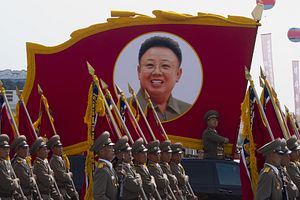December 17 marked the third anniversary of Kim Jong-il’s death. Traffic stopped and people bowed in a show of reverence for the country’s second “beloved” leader. Given the importance of North Korea’s Supreme Leader(s) and the cult of personality, the anniversary of Kim Jong-il’s death is noteworthy in and of itself. The event also is as good a point as any to stop and consider some important developments in North Korea and North-South relations. While there are many that could be pinpointed, three will be discussed here.
First, the anniversary itself marks the end of the three-year mandatory mourning period. Kim Jong-un is now free to implement a ruling system of his own – in theory, anyway. While the “hope springs eternal” camp will likely underscore this technicality as a real opportunity for change in North Korea, many more will remain skeptical.
Technicalities aside, there are some who are genuinely and justifiably enthusiastic that change is afoot. Andrei Lankov, a long-time pragmatist with regard to the prospects of economic “reform and opening,” writes in an op-ed at Al Jazeera that “It seems that, at long last, North Korea has decided to begin Chinese-style reforms.” This bold statement comes following the “May 30 measures,” announced earlier this year. “According to these measures, from 2015, North Korean farming households (for ideological purposes still branded ‘production teams’) will be allocated not 30 percent but 60 percent of the total harvest.” This plan for reform – and it is nothing more than a plan at this point – is seen by Lankov as a continuation of the “June 28 Measures,“ reforms implemented (and possibly aborted) during the early reign of Kim Jong-un. The June measures reduced agricultural farming teams to five or six people and allowed the farming production teams to keep a portion of their production (rather than give it all to the state). To what extent these reforms were implemented is hard to discern. However, if those claiming that Kim Jong-un has solidified his control are correct (or if even only partially wrong), then perhaps Lankov is actually onto something. There are, of course, those who doubt (but don’t deny) that North Korean is actually able to implement the May 30 measures. Stephen Haggard’s follow-up to Lankov’s article is a good example of this perspective.
Second, inter-Korean economic activity has picked up (a little), indicating a small, but not insignificant, change in Park Geun-hye’s North Korean policy. As explained in the latest edition of “Shigak” (a source reading effort at SinoNK.com), “Although rhetorically hardline, the administration of President Park Geun-hye has shifted policy toward North Korea. Nowhere is this more evident than in the decision to allow South Korean investment in Rasun, a de facto abrogation of the “May 24 Measure” that restricted inter-Korean trade and assistance following the sinking of the ROK Navy corvette Cheonan by a North Korean torpedo in March 2010. Three South Korean companies have contributed to developing the port at Rasun: POSCO, the Pohang-based steelmaker, Korail, and Hyundai Merchant Marine Co. “By utilizing the North Korean port facilities, the cost of transporting coal from the Russian east to South Korea’s industrial heartland is expected to decline by as much as 15 percent.” The first shipment of coal (45,000 tons) arrived at Pohang on November 29.
Third, assemblyman Park Ji-won’s brief trip to Kaesong to deliver a wreath of flowers for the anniversary of Kim Jong-il’s death is representative of a hope held by some that a breakthrough in North-South relations a la Kim Dae-jung is possible. While the gesture was deemed “humanitarian” and done in the name of Kim Dae-jung’s wife, Lee Hee-ho (who didn’t go herself due to health reasons), it is symbolic that an opposition party member was the one to deliver the flowers – and not a Saenuri Party assemblyperson or someone from the hard-left United Progressive Party (UPP). For the former, it would be seen as ideologically unsound and for the latter a genuine expression of gratitude to the former leader of North Korea (and thus unacceptable to the Park Geun-hye administration, which approved the gesture). There are certainly not a small number of opposition lawmakers who yearn for past times when engagement was the cornerstone of South Korea’s North Korea policy. For left-leaning dailies like the Hankyoreh, the trip is an example of what North-South relations aren’t (cooperative), but what could be if both sides just tried a little harder. However, for others, like conservative assemblyman Ha Tae-kyung, the commemoration of Kim Jong-il with a wreath of flowers is “disgraceful.”
Watch for these issues to develop further in the (lunar calendar) New Year. They represent some of the bigger issues in North Korea and North-South relations.

































